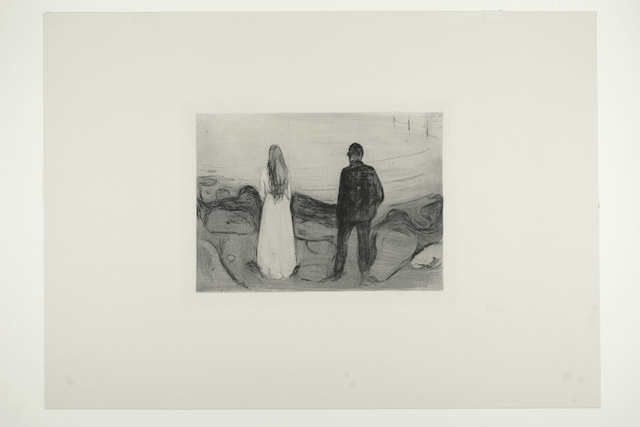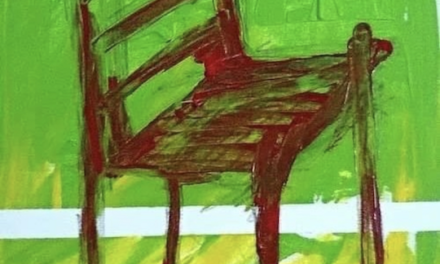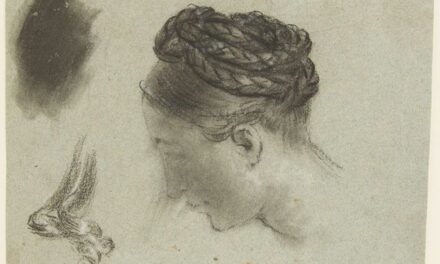Munch, Edvard. Two Human Beings. The Lines Ones. 1894, The Art Institute of Chicago.
Father Knows Best
by John McCaffrey
“Yes?”
Martin’s assistant, Jillian, opened the door to his office just wide enough to stick her head inside.
“Mr. Rigby is outside. He would like to see you.”
Martin felt his chest constrict. Rigby was in charge of the company’s human resources department. He was somewhat of a recluse, biding his time in a windowless office filled with files and forms. There were rumors he played a larger role than just administrative when it came to personnel decisions. This, and because Rigby’s standard mode of communication was by email or paper memo, made the morning’s visit unique. But to Martin it was alarming. For the past several quarters the marketing team he headed had not performed up to par, and with sales low he feared Rigby might have been sent to discuss a buyout or some sort of package to grease the wheels for his release.
“Can he come back another time?”
“I’ll ask.”
Jillian disappeared for a few moments while Martin continued to worry. When she returned she stepped inside and shut the door behind her.
“He says he needs to talk with you this morning,” she said, her voice low. “I told him you’re very busy. He says he can wait until you’re free.”
Martin exhaled. If it was bad news, he thought, better to get it over with now than obsess and fret about it all day.
“No, I’ll see him,” he finally said. “Just give me a moment to get ready.”
Jillian glanced at her wristwatch.
“I’ll wait five minutes and then send him in.”
Jillian left, closing the door once again. He could hear her in the outer office talking to Rigby. He eyed his own wristwatch and then opened the right bottom drawer of his desk. Inside were several bottles of pills. He lifted out one with a yellow label and popped the lid with his thumb. He shook a white tablet into his palm and swallowed it down with only his saliva. It was anti-anxiety medication prescribed by his internist. He had gone in complaining of chest pain, but after a battery of tests the problem was diagnosed as stress.
After returning the bottle, Martin leaned back, closed his eyes, and waited for the medication to kick in. But he felt no more relaxed when he heard Jillian’s voice again, followed by a single knock on the door.
Martin righted himself in the chair, doing his best to look calm.
“Come in.”
Rigby entered as if not trusting he was welcome, inching his body past the door.
“Jillian told me you can see me now.”
“Yes. Sorry to make you wait. I was inundated as usual with sales calls and new revenue opportunities. Please, have a seat.”
Rigby chose the far right of two chairs placed in front of the desk. Martin, despite his nervousness, could not help to admire the sober neatness of the man: from his military style haircut and impeccably shaved face, to his black business suit, white collared shirt, and dark-striped necktie.
“It’s been awhile,” Rigby said, settling in. “How are you?”
Martin wondered if the question was a trap, a well-meaning ploy by Rigby to get him to voice his insecurities, to open up and expose a weakness that might help the company validate a decision to let him go.
“Me,” he said, shooting Rigby his best smile. “I’m absolutely fabulous.”
It was not his first lie of the day, but it was the biggest. At the moment, he felt as far from fabulous as any time in his life. In addition to the chest pain and job worries, he was also having problems at home. For one, his ex-wife was petitioning the court to increase his monthly support to their only child, a 16-year-old daughter who was already costing him a fortune in private school tuition. He was also having trouble with his girlfriend, who, at thirty, was fifteen years his junior. Although they had been together only a year, she was pushing for marriage, something he vowed never to do again after his divorce. They fought regularly about the issue, and when they weren’t fighting, she sulked. To cope, in addition to the pills, he was drinking more, supplementing his usual two glasses of wine a night with an equal number of gin and tonics.
“In fact,” Martin continued, holding the grin until his lips began to tire. “I couldn’t complain if I wanted.”
“That’s wonderful,” Rigby said, bringing his hands together so that the tips of his fingers formed a mini-pyramid. “Unfortunately, my news might dampen your mood.”
Martin’s heart began to race. He released his smile and glanced at the desk drawer, wishing he had taken an extra pill.
“It’s your assistant,” Rigby continued. “We have to let her go.”
Martin looked up. A wave of relief washed over him. He liked Jillian, valued her skills, but it was better her than him.
“Is this a cost-cutting measure?”
Rigby lowered his hands and leaned forward in the chair.
“Actually,” he said, “it’s a legal matter.”
“She’s in trouble with the law?”
“Immigration. She’s been working in this country illegally.”
“You’re kidding?”
“It appears her visa expired years ago.”
Martin blinked with confusion.
“Jillian’s not a citizen?”
Rigby pressed back in the chair and shook his head.
“Born in Wales. She never told you?”
“Maybe, but I don’t remember. We never talk much about personal things. I mean, she doesn’t have an accent…does she?”
“Not a trace.”
“So you can see how I wouldn’t know. It’s not something one asks about, right?”
Rigby shrugged his shoulders.
“I certainly would have told you if I suspected anything,” Martin concluded. “You must believe I’m as surprised as anyone by this.”
Rigby nodded.
“I imagine it’s a shock. Arrangements can be made for you to talk with a counselor. Someone to help you process any difficult feelings you have about the loss.”
“Loss?”
“Jillian was with you for many years. It’s normal to be upset.”
Martin rubbed the underside of his chin. He did not want Rigby to think him uncaring and callous, but he also did not want word to get out within the company that he needed a counselor to deal with his feelings. Competent men and women were always after his job, and with sales tanking, someone ambitious might feel emboldened to topple him, if they thought he was vulnerable or losing his grip.
“Thank you for the thought,” he finally said. “It’s a loss, as you say, but I’ll do what I always do in times of strife: put my best foot forward and work that much harder.”
“That’s a great attitude, Martin. We won’t leave you short-handed. We’ve already started to interview candidates to replace Jillian.”
Martin nodded. It made him nervous to think how fast the company moved on things of this nature. Still, he hoped he might be given a say on a new hire. Now that he thought of it, if given the chance, he would prefer another woman, perhaps someone younger than Jillian, a little taller, more slender around the hips…
Rigby cleared his throat, interrupting Martin’s fantasy.
“I’ll arrange for Jillian to come to my office before the end of the day. From there she’ll be escorted out by security. Sometimes, in these cases, people have a tendency to feel sorry for someone and will let something slip out that makes things messy. So be careful. We want to do everything we can to minimize a scene…or something worse.”
Martin winced, remembering an upsetting moment with his girlfriend the night before. They were at an expensive restaurant, at a prime center table. He said something she didn’t like right after their entrees were served and she threw down her fork, nearly cracking the plate. She stomped out, leaving him with two full meals and the entire restaurant staring at him.
“Don’t worry,” he said, tapping his lips with a forefinger.
“Good. That’s very good.”
Martin waited for Rigby to continue, or to get up, but he did not speak or move, just sat focusing on his hands. The silence between them extended long enough that Martin began to feel antsy, his mind drifting to other things he needed to do, including calling his lawyer to see what could be done about his ex-wife’s petition. Ordinarily, he would have politely encouraged Rigby to leave, but with what just happened to Jillian, he felt it best to not make a move and, at least appear, patient.
After Rigby let out a sigh, Martin felt compelled to talk.
“Is everything okay?”
“I’m sorry,” Rigby said, looking up. “It’s just that something is on my mind lately….it’s personal?”
“Personnel…more firings?”
“No, no, I mean personal…about me?”
“Oh.”
“I apologize to even talk like this on work time, but would you have a moment? I could use some advice.”
Martin felt uncomfortable by Rigby’s sudden switch in tone and temperament. But he also felt a tendril of excitement, sensing an opportunity to make points with Rigby and, perhaps, use it as leverage to be in a position to pick an assistant or to stave off his own demise within the company if necessary.
“Take all the time you like.” Martin stretched his arms over his head and clasped his hands behind his neck, a posture he often adopted in meetings to feign contentment with an unwanted or boring conversation. “I’m here to listen.”
“That’s kind of you, Martin. I know I don’t have to ask, but this is strictly private between us.”
“Of course…what’s said in here stays in here.”
“I appreciate that. Well, it’s my wife. We’re thinking about a divorce. We haven’t been getting along for a while, and because we don’t have children, it seems like nothing is holding us together except fighting. But still…”
Martin could see that Rigby wanted him to finish the sentence, but he had no idea what to say. A sudden fluttering in his chest made him sit upright and lower his arms. Frightened, he pressed his fingers against his breastbone.
“Yes,” Rigby said, coming to life. “It gets me there…in the heart. I knew you would understand. That’s why I wanted to talk to you. I know you’ve been through it.”
The fluttering stopped and Martin eased his fingers away from his chest.
“And …” Rigby paused, flushing slightly. “I mean, it’s not a terrible thing to be single again…even at our age?”
Martin got it now. Rigby wanted him to tell him how great it was to be divorced, to be dating, to be free and clear of the institution of marriage. He certainly thought this way years ago, when he and his wife first split, and he saw every beautiful woman as a potential soul mate. But the last few years had blunted that idea, and now, in terms of happiness, at least with his current girlfriend, all he wanted was peace and quiet.
“I won’t lie to you,” he said. “It’s wonderful. There are more gorgeous women than you can count looking for a good man. You’ll have your pick.”
Rigby’s face relaxed.
“That’s what I hear. But it’s hard to believe. I guess I’m old fashioned. I must take after my parents. They just celebrated their fiftieth anniversary. I know they’ll be upset if my wife and I split up. How did you handle it?”
“Dating younger women?”
“No, telling your family about the divorce.”
“Oh.” Martin shrugged. “We’re not that close. My mother passed when I was young, and my three sisters live far away. I do remember my father calling me up right after he found out to see if I needed anything. He even wanted to pay for my lawyer.”
“I’ll take him up on that,” Rigby joked. “Divorce attorneys are expensive.”
“Mine certainly was.”
Martin shook his head, as if ruing the large law bill, when in actuality he was thinking about that phone call. He had been more angry than grateful by his father’s offer, feeling as if he didn’t think he could handle his own problems. He also had heard from one of his sisters that the old man was subsisting on a small, fixed income. But he knew that if he had said yes, that he needed the money, his father would have found a way to pay the tab. For some reason, this knowledge had made Martin feel even angrier.
“Your father,” Rigby said. “May I ask if he’s still with us?”
“Alive? Oh, yes. I believe he’s 83…or is it 84? Somewhere around there.”
“In good health?”
“Uh-huh,” Martin said, although he was not exactly sure. The last time he had spoken to his father was close to two years ago. But he assumed if there was anything wrong one of his sisters would have told him.
“Good for him,” Rigby said. “And for you if you inherited his genes.”
Martin forced out a smile. In reality, he was very much like his father, physically. People always commented when he was growing up how much they looked alike: how they shared the same build, features, that they even walked the same way. He didn’t mind it when he was young, but as he got older he began to resent the comparisons.
“I admire the older generation,” Rigby continued. “To me they worked hard and didn’t complain when things didn’t go their way. Now everyone wants to get to the top right away. I can’t tell you how many employees here think they can do the job better than the person above them. It’s why I was disappointed to learn about Jillian. She’s one of the few people in this company who never filed a grievance against their boss or came into my office to discuss a problem with another employee. And did you know she’s never taken a sick day? Not one. That type of dedication and endurance is very rare.”
“I pride myself on my work ethic as well,” Martin said, feeling defensive. “Perhaps she followed my example. I’m never sick.”
“I’m sure she did. Although last year, didn’t you have troubles with your back? Does it still trouble you?”
Martin had forgotten about the back. He had tweaked it one night, slipping on some ice outside a nightclub. It was not enough of an injury to slow him down, but he did use it as an excuse to take leave from work and go on vacation to the Bahamas.
“No, thankfully I’m perfectly fit and feeling well again.”
“So you do take after your father. Sorry to be so curious, but may I ask what he did for a living?”
“My father worked for an apparel company.”
“How interesting,” Rigby said. “What was his job?”
“A little bit of everything, I suppose.”
It was another lie. His father had been a maintenance worker in a shoe-making plant, a janitor. The totality of his duties were to sweep up between the assembly lines and take out the refuse. It was a non-union shop, so the pay wasn’t great. But it was steady work and the salary covered the family’s bills…or at least whatever his father felt was essential. Which, in his case, meant they didn’t own a car or even a television.
“My dad was a chef,” Rigby said. “French-trained. He loved to cook.”
Martin nodded. Now that Rigby had opened the floodgates, anything he said triggered a memory. Martin saw his father, youthful now, standing in front of the little stove in their home, making breakfast for him and his sisters, preparing sandwiches he would stuff in brown bags for them to take to school, rushing them out to the door so they could make class on time, and then riding his bicycle to the plant three miles away. His father also cooked dinner for them, every night. Never once did they eat out as a family, not in all the years Martin lived at home.
“You can imagine how wonderful we had it,” Rigby continued, patting his stomach. “I must say I felt very privileged growing up.”
Martin felt just the opposite. Maybe it was being raised with only the basics, or without a mother, but he always felt somehow deprived as a child. It fueled his decision to live a different life once he got out and was on his own, a life filled with as much luxury and love as possible. He had succeeded in some ways with luxury. Despite the divorce and child support, his job paid enough that he owned a high-priced condo, an expensive car, dined at the best restaurants, splurged regularly on vacations. But love had proven elusive. His marriage had failed, he felt estranged from his daughter, and he was on the brink of breaking up with yet another girlfriend.
“I’ve taken up too much of your time,” Rigby said, slapping his knees. “You can’t imagine how helpful this has been. I don’t even remember the last time I talked so much about things like this…you know, man-to-man.”
“I enjoyed it too.”
“I hope you know, Martin, that even if my door is closed, it’s open to you. You’re always welcome to come in and talk about anything that’s bothering you.”
Martin smiled.
“Thankfully, all’s good for me. But if I ever need anything, I’ll take you up on it.”
“Please do.”
Martin watched Rigby leave. He was about to reach down for another pill when Jillian stuck her head into the office.
“Ms. Cohn called while you were meeting with Mr. Rigby. She wants to know if you can have lunch with her?”
Martin exhaled through his nose. Cohn was his direct supervisor. He knew she was waiting on him to provide some new ideas on how to jumpstart sales.
“Today?”
“Yes. She’s suggested that new French place nearby.”
“I see.”
Jillian stepped in further.
“What would you like me to tell her?”
Martin hesitated.
“Is it any good?” he finally said. “The French place?
“I wish I could tell you, but I always eat at my desk.”
“Oh. Right.”
“So…Ms. Cohn?”
Martin hesitated again, looking at Jillian, suddenly feeling a vague sense of nostalgia…or was it despair? He wasn’t sure.
“I’d rather not with her,” he said. “Perhaps you might join me for lunch? We’ll go somewhere nice…my treat.”
Jillian blinked into the invitation.
“That’s kind of you, sir, but I brought my lunch from home.”
“Save it for dinner. You can have whatever you like today: shrimp, steak, lobster…you name it.”
“I’m sorry sir, but I’ll pass. I made an egg salad sandwich I really like. Besides, I don’t want you to spend money on me.”
“Don’t be silly. Let’s live a little.”
“Please, don’t let me stop you. You should go enjoy a nice lunch. I’m fine.”
Martin began to get angry. He stared hard at Jillian. She wasn’t making this easy.
“Don’t you get it?” he snapped. “I don’t want to eat with Ms. Cohn. Can’t you forget your stupid brown bag this one time, throw your egg salad in the garbage and enjoy a decent meal?”
Jillian’s face hardened.
“It’s not in a brownbag, sir. My sandwich, it’s in Tupperware. It keeps it fresh.”
Martin tried to gather himself.
“Right, I was just making a point…about the need to enjoy yourself. You shouldn’t worry about every penny. It’s important to live for the moment, indulge in life’s pleasures, because you never know what the future might hold. Remember that.”
“I will, sir.”
“I suppose then I’ll have to eat with Ms. Cohn.”
Jillian shook her head.
“I can call her back and say you left before I could tell you she wanted to meet with you. I’m happy to take the blame to help you out.”
Martin looked at Jillian, genuinely puzzled.
“Why?” he said after a moment.
“Sir?”
“Why would you take the blame? Why are you always so happy to help me out, to do anything I ask, to never ask anything from me. Why?”
“Because it’s my job.”
“It’s more than that,” Martin said. “Everyone has a job, but not everyone is like you: not everyone is loyal, or dutiful, or even decent. What’s wrong with you?”
Jillian blinked again. Martin thought he saw tears forming in her eyes.
“I’m sorry,” he said. “I didn’t mean to upset you. It’s just a stressful time for me.”
“I understand, sir. But things will get better. They always do.”
“I appreciate that.” He paused. “I appreciate you.”
“Thank you, sir. Should I call Ms. Cohn now?”
“Please.”
Martin watched as Jillian left the office. His anxiety, strangely, had lifted, replaced by a melancholy which made him feel sad but somewhat grounded. It was as if a heavy blanket had been wrapped around his shoulders, holding him down but also keeping him sheltered.
Jillian came back, smiling.
“Ms. Cohn said next week for lunch will work just as well.”
“Thanks.”
Jillian turned to leave the office.
“Jillian?”
“Yes?”
“Would you mind bringing your lunch in here? I mean, I’d like it if we could eat together today… if that’s okay with you?”
“If that’s what you want, sir. Should I order you some takeout?”
Martin bowed his head a moment before looking back at Jillian
“Actually, I haven’t had a homemade sandwich in a long time. Do you think I could have half of your egg salad?”
“Of course, sir,” Jillian said, her face brightening. I also have carrot sticks.”
Jillian was not long away. When she came back she laid out the lunch picnic style on Martin’s desk, making sure to give him a paper plate and several napkins along with a Styrofoam glass full of cold water. They ate mostly in silence, but it was not uncomfortable. In fact, Martin could not remember a more relaxing meal, listening to the sound of them chewing and swallowing, the hard crunching of the carrots.
After they finished, Jillian cleaned up and went back to her desk. An hour or so later, Martin heard her phone ring. She came in after to tell him she had to run down to Mr. Rigby’s office. She asked if he needed her to bring him back anything. Martin, for the first time that day, told the truth: he needed nothing.
Originally from Rochester, New York, John McCaffrey graduated from Villanova University, and later received his MA in Creative Writing from the City College of New York. His stories, essays and book reviews have appeared in more than 30 literary journals, magazines and newspapers. A Pushcart Prize nominee, his story Words, first published in Fiction Magazine, was also selected for Flash Fiction Forward, an anthology containing work from some of the most noted writers of our time, including Grace Paley, Dave Eggers, and Paul Theroux. John also helps direct a nonprofit organization in New York City and is an Adjunct Creative Writing Professor at the College of New Rochelle’s School of NewResources. His debut novel, The Book of Ash, was released by Boxfire Press in 2013.






